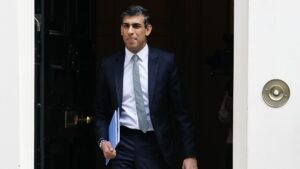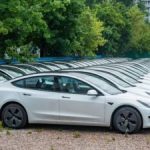
Rishi Sunak has told the cabinet that interest rates are expected to increase to 2.5 per cent over the next year as he warned ministers against borrowing more to fund public spending.
The chancellor told colleagues on Tuesday that homeowners could see their mortgage payments rise by more than £1,000 a year if they are not on fixed-rate deals.
He said that the financial markets had already priced in a succession of interest rate rises, which could reach 2.5 per cent, adding that borrowing risked stoking inflation further.
A 1 percentage point rise on a typical mortgage equated to £700, he said as he argued that cutting the deficit was vital to keeping interest rates down.
Sunak is under pressure from Tory MPs and some cabinet ministers to do more to help people with the cost of living. He told Mumsnet: “I want to be sure that . . . I don’t make the problem worse. That’s why I can’t always do everything that people want, because it actually might make the situation worse, particularly with those on mortgages with rising interest rates.”
The chancellor has rejected calls from Labour and Tory MPs to bring forward plans to confront the crisis over the cost of living. He is planning a major intervention in his autumn budget, before the energy price cap rises.
Forecasts suggest that energy bills could rise by as much as 40 per cent in October to nearly £3,000 a year. Sunak argued that it would be “silly” to intervene now.
He said: “It would be silly to do that now, or last month, or the month before, when we don’t know exactly what the situation in the autumn is going to be.”
He defended himself against charges that he is too rich to understand people’s struggles with the cost of living in the wake of a row about his wife’s non-domiciled tax status.
“Judge me on my actions,” he said. “I don’t judge people by how much money they have in their bank account, I look at their character, their values and how they’re acting.”
Challenged on accusations that as a multimillionaire he is insulated from the consequences of the decisions he makes for voters struggling to make ends meet, Sunak said: “Of course now I’m in a fortunate position, but I didn’t start like that.”
He said that his achievements were “a result of so many people’s kindness, hard work, sacrifice throughout my life”, citing his grandparents arriving in Britain with very little. He added: “I never forget the values that I was raised with, and actually what I then try and do is express those values through the work I do in this job.”
Sunak said he was working “day and night” and that getting into politics was “my way of trying to use all the things that have been given to me to make a difference”.
During cabinet on Tuesday several ministers put forward ideas to help tackle the cost of living that would not cost any additional money. However, doubts emerged yesterday about the viability of the plans.
Grant Shapps, the transport secretary, said there was “a lot of road to cover” before he could relax safety rules and allow drivers to get an MoT test only every other year.
Karl McCartney, a Conservative member of the Commons transport committee, said it was “absolutely crass” to suggest that changing rules on MoTs would help significantly with the cost of living. He said the money saved on a £54.85 test was “a drop in the ocean” for drivers.
Shapps told the committee that “cars have clearly become a lot more reliable than when the MoT, named after the Ministry of Transport, was put in place”, but said that a “very rigorous safety standard” would have to be met to make a change.
Anne-Marie Trevelyan, the international trade secretary, poured cold water on a plan to cut tariffs on imported food, saying it would have a tiny impact on bills. She told MPs on the international trade committee that unilateral reductions in tariffs would reduce leverage on other countries to reduce their own in trade negotiations.
Trevelyan is said to have been unaware of a plan floated by Jacob Rees-Mogg, the Brexit opportunities minister, and told MPs that while “all of us across every department are very focused on thinking about . . . where we can find ways to reduce costs”, the plan was mired in legal complexities over World Trade Organisation rules.
Read more:
Rishi Sunak warns of more pain with mortgage bills to rise by £1,000




